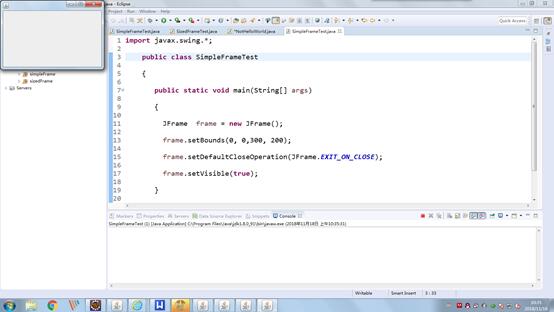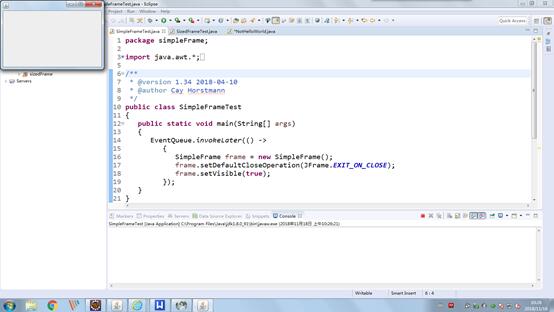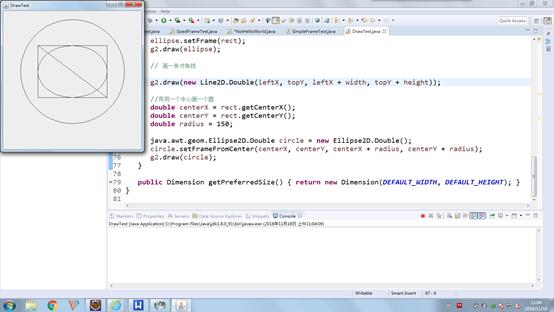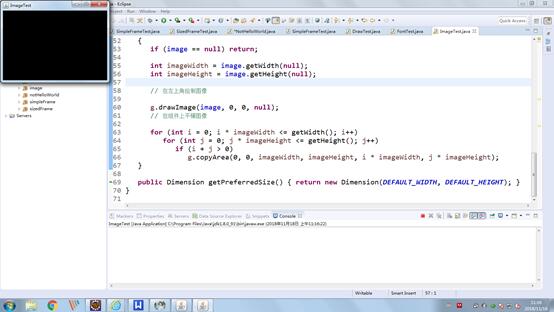第一部分:理论知识
1.AWT与Swing简介
(1)Swing用户界面库是非基于对等体的GUI工具箱。
Swing具有更丰富并且更方便的用户界面元素集合。
Swing对底层平台的依赖很少,因此与平台相关的bug很少。
Swing会带来交叉平台上的统一视觉体验。
Swing类库被放在javax.swing包里。
(2)两者之间的关系:
大部分AWT组件都有其Swing的等价组件。
Swing组件的名字一般是在AWT组件名前面添加一个字母“J”,如:JButton,JFrame,JPanel等。
2.创建框架
(1)组件:通常把由Component类的子类或间接子类创建的对象称为一个组件。
(2)容器是Java中能容纳和排列组件的组件。.常用的容器是框架(Frame,JFrame)
(3)Container类提供了一个方法add(),用来在容器类组件对象中添加其他组件。
(4)容器本身也是一个组件,可以把一个容器添加到另一个容器里,实现容器嵌套。
3.框架
(1)创建空框架
. 在Java中,常采用框架(Frame)创建初始界面,即GUI的顶层窗口. AWT库中有一个基于对等体的Frame类。
. 该类的Swing版本为JFrame,JFrame是Frame子类。
定位:
—常用Component类的setLocation和setBounds方法常用属性
—Title:框架标题
—IconImage:框架图标
java.awt.Component 1.0
– boolean isVisible() 检查组件是否可见
– void setVisible(boolean b) 设置组件可见
– void setSize(int width,int height) 把组件缩放到指
定宽度和高度
– void setBounds(int x,int y,int
width,int height) 移动并缩放组件
– Dimension getSize() 得到组件的大小
– void setSize(Dimension d) 把组件缩放到指定的大小
4.2D图形
(1)Java SE了包含一个Java 2D库,该库提供了一个非常强大的图形操作集。
(2) Graphics 2D 类是Graphics 类的子类, Graphics2D类对象通常可用Graphics对象转换而来。
5.颜色的使用
Graphics2D类的setPaint方法(Graphics类为setColor方法)用来设置颜色。
例:g2.setPaint(Color.RED);g2.drawString(“Set Color”,100,100);
(1)Color类中定义的13种标准颜色
BLACK、BLUE、CYAN、DARK_GRAY、GRAY、GREEN、
LIGHT_GRAY、MAGENTA、ORANGE、PINK、RED、
WHITE、YELLOW
6,字体的使用:
(1)AWT中定义的五种逻辑字体名
SanaSerif
Serif
Monospaced
Dialog
DialogInput
这些逻辑字体在不同语言和操作系统上映射为不同
的物理字体。
(2)字体风格
Font.PLAIN
Font.BOLD
Fond.ITALIC
Fond.BOLD + Font.ITALIC
(3)设置字体
Font serif=new Font(“Serif”,Font.BOLD,14);
g2.setFont(serif);
第二部分:实验部分:
1、实验目的与要求
(1) 掌握Java GUI中框架创建及属性设置中常用类的API;
(2) 掌握Java GUI中2D图形绘制常用类的API;
(3) 了解Java GUI中2D图形中字体与颜色的设置方法;
(4) 了解Java GUI中2D图像的载入方法。
2、实验内容和步骤
实验1: 导入第10章示例程序,测试程序并进行代码注释。
测试程序1:
l 运行下列程序,观察程序运行结果。
|
import javax.swing.*; public class SimpleFrameTest { public static void main(String[] args) { JFrame frame = new JFrame(); frame.setBounds(0, 0,300, 200); frame.setDefaultCloseOperation(JFrame.EXIT_ON_CLOSE); frame.setVisible(true); } } |
package demo;
import javax.swing.*;
public class SimpleFrameTest
{
public static void main(String[] args)
{
JFrame frame = new JFrame();
frame.setBounds(300, 300,300, 300);//前两个参数是位置,后两个参数是窗口的长和宽
frame.setDefaultCloseOperation(JFrame.DO_NOTHING_ON_CLOSE);//设置默认的关闭操作
frame.setVisible(false); //设置窗口是否可见
}
}

l 在elipse IDE中调试运行教材407页程序10-1,结合程序运行结果理解程序;与上面程序对比,思考异同;
l 掌握空框架创建方法;
l 了解主线程与事件分派线程概念;
l 掌握GUI顶层窗口创建技术。
package simpleFrame;
import java.awt.*;
import javax.swing.*;
/**
* @version 1.34 2018-04-10
* @author Cay Horstmann
*/
public class SimpleFrameTest
{
public static void main(String[] args)
{
EventQueue.invokeLater(() ->
{
SimpleFrame frame = new SimpleFrame();
frame.setDefaultCloseOperation(JFrame.EXIT_ON_CLOSE);//
frame.setVisible(true);//判断页面是否可见
});
}
}
class SimpleFrame extends JFrame
{
private static final int DEFAULT_WIDTH = 300;
private static final int DEFAULT_HEIGHT = 200;
public SimpleFrame()//构造器
{
setSize(DEFAULT_WIDTH, DEFAULT_HEIGHT);//设置弹出页面的大小
}
}

测试程序2:
l 在elipse IDE中调试运行教材412页程序10-2,结合程序运行结果理解程序;
l 掌握确定框架常用属性的设置方法。
package sizedFrame;
import java.awt.*;
import javax.swing.*;
/**
* @version 1.35 2018-04-10
* @author Cay Horstmann
*/
public class SizedFrameTest
{
public static void main(String[] args)
{
EventQueue.invokeLater(() ->
{
SizedFrame frame = new SizedFrame();
frame.setTitle("SizedFrame");
frame.setDefaultCloseOperation(JFrame.EXIT_ON_CLOSE);
frame.setVisible(true);
});
}
}
class SizedFrame extends JFrame
{
public SizedFrame()
{
//获取屏幕尺寸
Toolkit kit = Toolkit.getDefaultToolkit();
Dimension screenSize = kit.getScreenSize();
int screenHeight = screenSize.height;
int screenWidth = screenSize.width;
// 设置框架宽度、高度并让平台选择屏幕位置
setSize(screenWidth / 2, screenHeight / 2);
setLocationByPlatform(true);
//设置帧图标
Image img = new ImageIcon("icon.gif").getImage();
//生成ImgeIcon类对象,调用此对象的getImage方法
setIconImage(img); //用来定义用户界面的图标
}
}

测试程序3:
l 在elipse IDE中调试运行教材418页程序10-3,结合运行结果理解程序;
l 掌握在框架中添加组件;
l 掌握自定义组件的用法。
package notHelloWorld;
import javax.swing.*;
import java.awt.*;
/**
* @version 1.34 2018-04-10
* @author Cay Horstmann
*/
public class NotHelloWorld
{
public static void main(String[] args)
{
EventQueue.invokeLater(() ->
{
NotHelloWorldFrame frame = new NotHelloWorldFrame();
frame.setTitle("NotHelloWorld");
frame.setDefaultCloseOperation(JFrame.EXIT_ON_CLOSE);
frame.setVisible(true);
});
}
}
/**
* A frame that contains a message panel
*/
class NotHelloWorldFrame extends JFrame
{
public NotHelloWorldFrame()
{
add(new NotHelloWorldComponent());//将指定组件追加到此容器的尾部
pack();
}
}
/**
* A component that displays a message.
*/
class NotHelloWorldComponent extends JComponent
{
public static final int MESSAGE_X = 75;
public static final int MESSAGE_Y = 100;
private static final int DEFAULT_WIDTH = 300;
private static final int DEFAULT_HEIGHT = 200;
public void paintComponent(Graphics g)
{
g.drawString("Not a Hello, World program", MESSAGE_X, MESSAGE_Y);
}
public Dimension getPreferredSize() { return new Dimension(DEFAULT_WIDTH, DEFAULT_HEIGHT); }
}

测试程序4:
l 在elipse IDE中调试运行教材424 -425页程序10-4,结合程序运行结果理解程序;
l 掌握2D图形的绘制方法。
package draw;
import java.awt.*;
import java.awt.geom.*;
import java.awt.geom.Rectangle2D.Double;
import javax.swing.*;
/**
* @version 1.34 2018-04-10
* @author Cay Horstmann
*/
public class DrawTest
{
public static void main(String[] args)
{
EventQueue.invokeLater(() ->
{
DrawFrame frame = new DrawFrame();
frame.setTitle("DrawTest");
frame.setDefaultCloseOperation(JFrame.EXIT_ON_CLOSE);
frame.setVisible(true);
});
}
}
/**
* A frame that contains a panel with drawings
*/
class DrawFrame extends JFrame
{
public DrawFrame()
{
add(new DrawComponent());
pack();
}
}
/**
* A component that displays rectangles and ellipses.
*/
class DrawComponent extends JComponent
{
private static final int DEFAULT_WIDTH = 400;
private static final int DEFAULT_HEIGHT = 400;
public void paintComponent(Graphics g)
{
Graphics2D g2 = (Graphics2D) g;
// 画一个长方形;
double leftX = 100;
double topY = 100;
double width = 200;
double height = 150;
Double rect = new Rectangle2D.Double(leftX, topY, width, height);
g2.draw(rect);
// 画封闭椭圆
java.awt.geom.Ellipse2D.Double ellipse = new Ellipse2D.Double();
ellipse.setFrame(rect);
g2.draw(ellipse);
// 画一条对角线
g2.draw(new Line2D.Double(leftX, topY, leftX + width, topY + height));
//用同一个中心画一个圆
double centerX = rect.getCenterX();
double centerY = rect.getCenterY();
double radius = 150;
java.awt.geom.Ellipse2D.Double circle = new Ellipse2D.Double();
circle.setFrameFromCenter(centerX, centerY, centerX + radius, centerY + radius);
g2.draw(circle);
}
public Dimension getPreferredSize() { return new Dimension(DEFAULT_WIDTH, DEFAULT_HEIGHT); }

}
测试程序5:
l 在elipse IDE中调试运行教材432页-433程序10-5,结合程序运行结果理解程序;
l 了解2D图形中字体的设置的方法;
package font;
import java.awt.*;
import java.awt.font.*;
import java.awt.geom.*;
import java.awt.geom.Rectangle2D.Double;
import javax.swing.*;
/**
* @version 1.35 2018-04-10
* @author Cay Horstmann
*/
public class FontTest
{
public static void main(String[] args)
{
EventQueue.invokeLater(() ->
{
FontFrame frame = new FontFrame();
frame.setTitle("FontTest");
frame.setDefaultCloseOperation(JFrame.EXIT_ON_CLOSE);
frame.setVisible(true);
});
}
}
/**
* A frame with a text message component
*/
class FontFrame extends JFrame
{
public FontFrame()
{
add(new FontComponent());
pack();
}
}
/**
* A component that shows a centered message in a box.
*/
class FontComponent extends JComponent
{
private static final int DEFAULT_WIDTH = 300;
private static final int DEFAULT_HEIGHT = 200;
public void paintComponent(Graphics g)
{
Graphics2D g2 = (Graphics2D) g;
String message = "Hello, World!";
Font f = new Font("Serif", Font.BOLD, 36);
g2.setFont(f);
// 测量消息的大小
FontRenderContext context = g2.getFontRenderContext();
Rectangle2D bounds = f.getStringBounds(message, context);
// 设置(x,y)=文本左上角
double x = (getWidth() - bounds.getWidth()) / 2;
double y = (getHeight() - bounds.getHeight()) / 2;
// 增加到Y到达基线
double ascent = -bounds.getY();
double baseY = y + ascent;
// 汲取信息
g2.drawString(message, (int) x, (int) baseY);
g2.setPaint(Color.LIGHT_GRAY);
// 绘制基线
g2.draw(new Line2D.Double(x, baseY, x + bounds.getWidth(), baseY));
// 绘制封闭矩形
Double rect = new Rectangle2D.Double(x, y, bounds.getWidth(), bounds.getHeight());
g2.draw(rect);
}
public Dimension getPreferredSize() { return new Dimension(DEFAULT_WIDTH, DEFAULT_HEIGHT); }
}

测试程序6:
l 在elipse IDE中调试运行教材436页-437程序10-6,结合程序运行结果理解程序;
l 了解2D图形图像的显示方法。
package image;
import java.awt.*;
import javax.swing.*;
/**
* @version 1.34 2015-05-12
* @author Cay Horstmann
*/
public class ImageTest
{
public static void main(String[] args)
{
EventQueue.invokeLater(() ->
{
JFrame frame = new ImageFrame();
frame.setTitle("ImageTest");
frame.setDefaultCloseOperation(JFrame.EXIT_ON_CLOSE);
frame.setVisible(true);
});
}
}
/**
* A frame with an image component
*/
class ImageFrame extends JFrame
{
public ImageFrame()
{
add(new ImageComponent());
pack();
}
}
/**
* A component that displays a tiled image
*/
class ImageComponent extends JComponent
{
private static final int DEFAULT_WIDTH = 300;
private static final int DEFAULT_HEIGHT = 200;
private Image image;
public ImageComponent()
{
image = new ImageIcon("blue-ball.gif").getImage();
}
public void paintComponent(Graphics g)
{
if (image == null) return;
int imageWidth = image.getWidth(null);
int imageHeight = image.getHeight(null);
// 在左上角绘制图像
g.drawImage(image, 0, 0, null);
// 在组件上平铺图像
for (int i = 0; i * imageWidth <= getWidth(); i++)
for (int j = 0; j * imageHeight <= getHeight(); j++)
if (i + j > 0)
g.copyArea(0, 0, imageWidth, imageHeight, i * imageWidth, j * imageHeight);
}
public Dimension getPreferredSize() { return new Dimension(DEFAULT_WIDTH, DEFAULT_HEIGHT); }

}
package image;
import java.awt.*;
import javax.swing.*;
/**
* @version 1.34 2015-05-12
* @author Cay Horstmann
*/
public class ImageTest
{
public static void main(String[] args)
{
EventQueue.invokeLater(() ->
{
JFrame frame = new ImageFrame();
frame.setTitle("ImageTest");
frame.setDefaultCloseOperation(JFrame.DISPOSE_ON_CLOSE);
frame.setVisible(true);
});
}
}
/**
* A frame with an image component
*/
class ImageFrame extends JFrame
{
public ImageFrame()
{
add(new ImageComponent());
pack();
}
}
/**
* A component that displays a tiled image
*/
class ImageComponent extends JComponent
{
private static final int DEFAULT_WIDTH =500;
private static final int DEFAULT_HEIGHT = 300;
private Image image;
public ImageComponent()
{
image = new ImageIcon("water.gif").getImage();
}
public void paintComponent(Graphics g)
{
if (image == null) return;
int imageWidth = image.getWidth(null);
int imageHeight = image.getHeight(null);
// 在左上角绘制图像
g.drawImage(image, 0, 0, null);
// 在组件上平铺图像
for (int i = 0; i * imageWidth <= getWidth(); i++)
for (int j = 0; j * imageHeight <= getHeight(); j++)
if (i + j > 0)
g.copyArea(0, 0, imageWidth, imageHeight, i * imageWidth, j * imageHeight);
}
public Dimension getPreferredSize() { return new Dimension(DEFAULT_WIDTH, DEFAULT_HEIGHT); }
}

实验2:课后完成PTA平台题目集:2018秋季西北师范大学面向对象程序设计(Java)练习题集(ch6-ch9)
第三部分:实验总结:
本周学习了图形程序设计的内容,基本了解了用户界面的框架设置、属性,以及如何关闭窗口,用JFrame。(EXIT_ON_CLOSE、JFrame.DO_NOTHING_ON_CLOSE的用法);本章知识对我而言就是2D图形的处理,在web前段开发技术课程中基本了解了字体、颜色的设置,最基本的用法需要牢记掌握,因此这一章比较容易理解这部分的内容;最后一个实验,需要修改一下窗口的可关闭操作以及图片的路径设置,在实验课上,有了学长的演示,下来自己做的时候就很简单。但是毕竟这是在引领下完成的,我还需要思考自己能不能做出来。